For gas, I was able with an SM, to experiment with a variety of methods of using my heating systems, for better economy - the most economical way, without being cold, was to maintain a fairly low CH temperature most of the time, increasing it only when needed, and make more use of a living room gas fire, for a higher temperature, especially in the evening.
I also wanted to work out what the central heating used. Theory was easy, having a modulating boiler which can gain latent heat should use less than a boiler being switched on/off so never gets chance to modulate, however my request for a smart gas meter was denied unless I also had a smart electric meter.
Also told unlike an clamp on ammeter the gas meters don't show use going up/down as the boiler modulates, so hard to work out if increased/decreased use is due to temperature change, opening doors etc. Or the change from digital to the claimed better analogue control.
I however did not with the move to analogue control the radiators ran a lot cooler, and the hysteresis was very much reduced. And putting a thermometer in the rooms with the electronic TRV's set up properly the room temperature remained static at what the TRV was set to. It raised the question what is a wall mounted digital (on/off) thermostat for?
However on moving to a house with an oil boiler, which does not modulate, I have found the electronic TRV heads do not work nearly as well. OK I can easy turn off rooms not in use, and set times when rooms are heated, but the control is no where near as good as when using a modulating gas boiler, however the cost of heating has dropped, maybe as rooms not really warm enough?
I made a mistake, I was told Nest worked with Energenie, it seems it doesn't, and to spend another £300 or more to correct grieves me, so looking for a second thermostat to work in parallel with the first, so two heated areas control if boiler runs or not.
However this
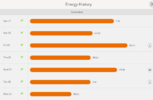
is useless, it tells me when Nest asked the boiler to run, not when the boiler was actually running. The boiler fires up until the return water gets hot, then it turns off, so when it says it was running 7 hours, it means it ran for less than 7 hours, but as to how long, no idea. If the Nest was on a modulating boiler then even worse, as if set up correctly it could well show running for 24 hours, but clearly running at 6 kW for 24 hours is not as much as running at 28 kW for 6 hours, so the figures are very misleading.
I have been looking at what my tumble drier is using, again this
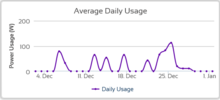
is misleading, yes it shows when my wife did a lot of washing, but I know it uses around 600 watt, and it does with some loads switch on/off during the drying cycle,the cycle is longer than the just over an hour which is recent usage, so one needs to stitch the record together to show whole cycle, and the average hourly usage smooths out the display so you can't see what is going on, this

is one stitched together. Trying to read this on a meter showing whole house is near impossible I see from my solar software
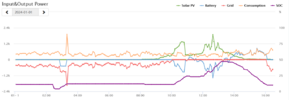
that from 10 am to 4 pm I did not import any power from the grid, but there is no way from that I can work out when central heating turned on, or when lights were used, may be able to work out when I made coffee, or had a shower, even isolating consumption alone
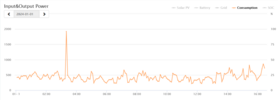
one can only really work out when we had a shower, can't even see when I made coffee, maybe the smart meter display is better? Some one with one maybe will show us what it tells one, I could turn off RCBO's and see what each one is using, but easier to use a clamp on ammeter for that.
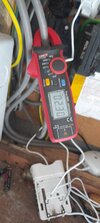
I have done that, and I have shown that main power use is the 5 refrigeration units my wife and daughter use, two fridge freezers, one chest freezer, one upright freezer, and a small freezer converted into a fridge to keep my beer cold, add my brew heater, and central heating there are so many items switching on/off to monitor house as a whole is rather pointless. And can be done without having a smart meter, as I am showing since I don't have one.
The old battery case in the picture is the old meter provided by Scottish power which was used before the Smart meters came in, now made obsolete by the solar panel display.
As a matter of interest,why were you 'against' them?
I was worried about a huge bill if I got a leak. Since I have no easy read display, one needs to go out into the road to read it, we have no idea on how much water used until we get the bill. I actually shine a torch into the oil tank more often to see how much oil left than read the water meter, in fact I have never read it.
The electric meter I take a picture of each time my wife asks for a reading, since she deals with it, I have no real idea of how much solar panels have helped, however in summer I think I will use the AC more as it will be only costing what the electric company would have paid me if exported instead.







